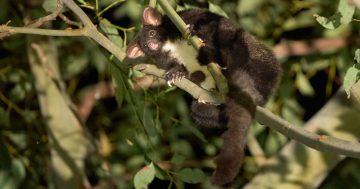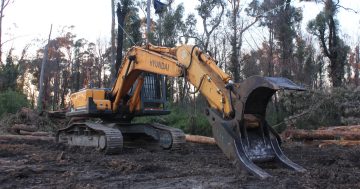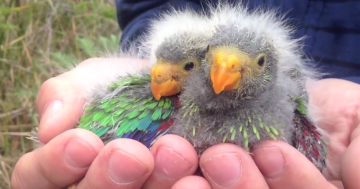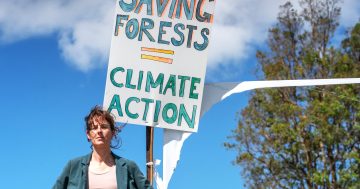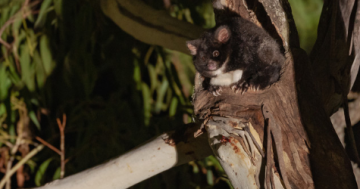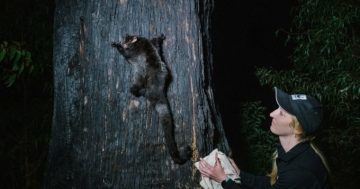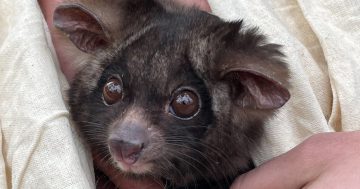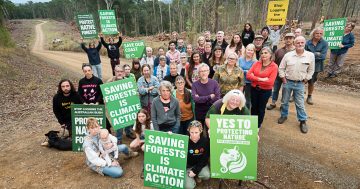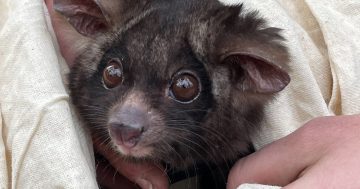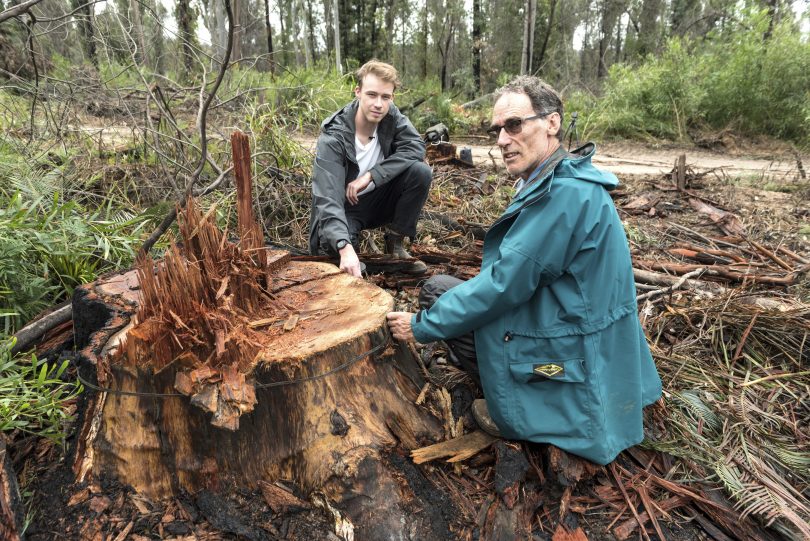
Nature Conservation Council campaigner Wilson Harris and Friends of Mogo Forest spokesperson Nick Hopkins measure a stump of a large ironbark in Mogo State Forest on April 25. Photo: Max Phillips.
Campaigners from the Nature Conservation Council and Friends of Mogo Forest are calling on the Forestry Corporation of NSW to explain an alleged breach of its own regulations after a large tree was logged contravening the corporation’s own rules.
The recent logging operation in the Mogo State Forest has now come under fire by the campaigners who say the corporation appears to have breached its own post-fire logging guidelines in Mogo State Forest by cutting down a large ironbark – a feed tree for the critically endangered swift parrot.
Swift parrots migrate from Tasmania to the mainland during winter and feed on the nectar of trees including South Coast ironbarks.
A large population of swift parrots was also discovered in the ACT last week, which prompted ACT Environment Minister Rebecca Vassarotti to put pressure on the Federal Government to take immediate steps to protect their habitat from logging.
“Outside the ACT, their habitat is under attack, with their breeding grounds in south-east Tasmania and important winter habitat on the NSW south coast both being logged,” Ms Vassarotti said.
Conservation ecologist at the ANU Dr Debbie Saunders also condemned logging operations, saying swift parrots forage in big, older trees with natural hollows and have had to travel further between breeding seasons.
“The logging of mature habitat reduces both the availability and quality of food resources for swift parrots. This increases pressure on the population to travel further for less food, reducing their overall fitness and ability to return in good condition to their breeding areas,” Dr Saunders said.
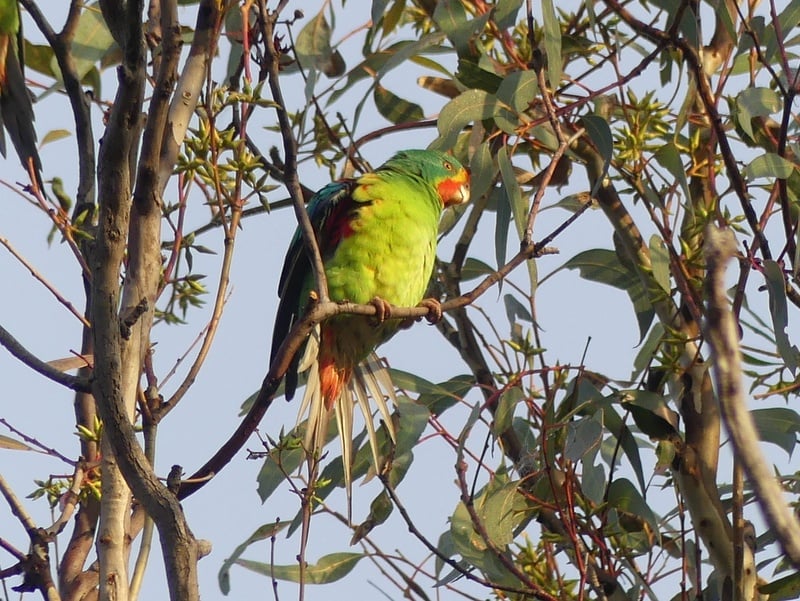
A swift parrot at home among the gum trees of Canberra last week. Photo: Ian Fraser.
The alleged breach was detected by members of the NSW Nature Conservation Council and Friends of Mogo Forest on May 7, who discovered the stump of an ironbark with a diameter of more than 115 cms.
They say the Forestry Corporation’s harvest plan for the Mogo State Forest compartment states all trees larger than 100 cms in diameter must be retained and marked with an ‘H’.
The Nature Conservation Council (NCC) has written to Forestry Corporation asking it to investigate the alleged breach and put in place measures to ensure it doesn’t happen again.
Friends of Mogo Forest spokesperson Nick Hopkins said every tree removed from that forest is a potential source of nectar for the swift parrot on its annual migration.
“Logging swift parrot feed trees puts another nail in the coffin for this amazing species. The forests between Ulladulla and Merimbula are listed as a key biodiversity area for this species, with the greatest threat facing this species and habitat being logging,” Mr Hopkins said.
NCC campaigner Wilson Harris said there are believed to be only 350 swift parrots left in the wild which makes it one of the rarest birds on earth.
“Swift parrots use ironbark trees like the one the Forestry Corporation contractors cut down as a vital food source,” he said.
“NCC and the Friends of the Mogo Forest are calling for an immediate moratorium on native forest logging and a rapid transition to plantation forestry.
“This region simply can’t sustain a native forest logging industry after the Black Summer bushfires.”
Mr Harris also said a rally at Batemans Bay on 22 May will oppose the Forestry Corporation’s plan to log 18 more compartments between Ulladulla and Batemans Bay.
The Forestry Corporation of NSW said the recommencement of harvesting would allow the timber industry on the South Coast to stay in business following the 2019-2020 bushfires and avert job losses in local communities.
Forestry Corporation’s general manager of hardwood forests Daniel Tuan said they had worked constructively with the Environment Protection Authority for the last 16 months to negotiate site-specific operating conditions for each harvesting operation in bushfire-affected coastal forests.
“We believe these additional environmental safeguards provide the right balance which Forestry Corporation is required to strike between environmental considerations, the need to support the regional communities reliant on timber industry jobs, and meet its supply commitments with small family businesses and key local mills,” Mr Tuan said.






